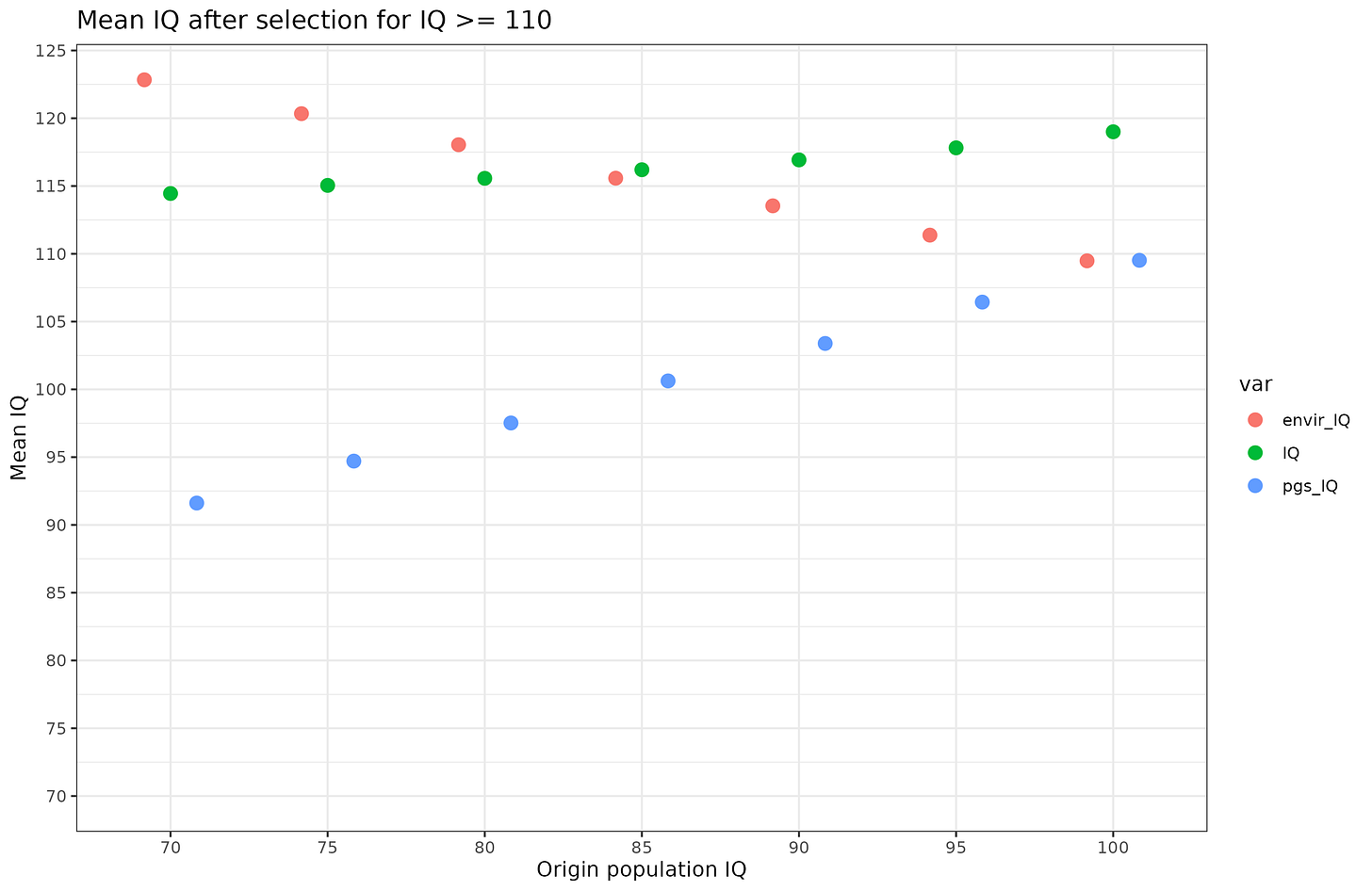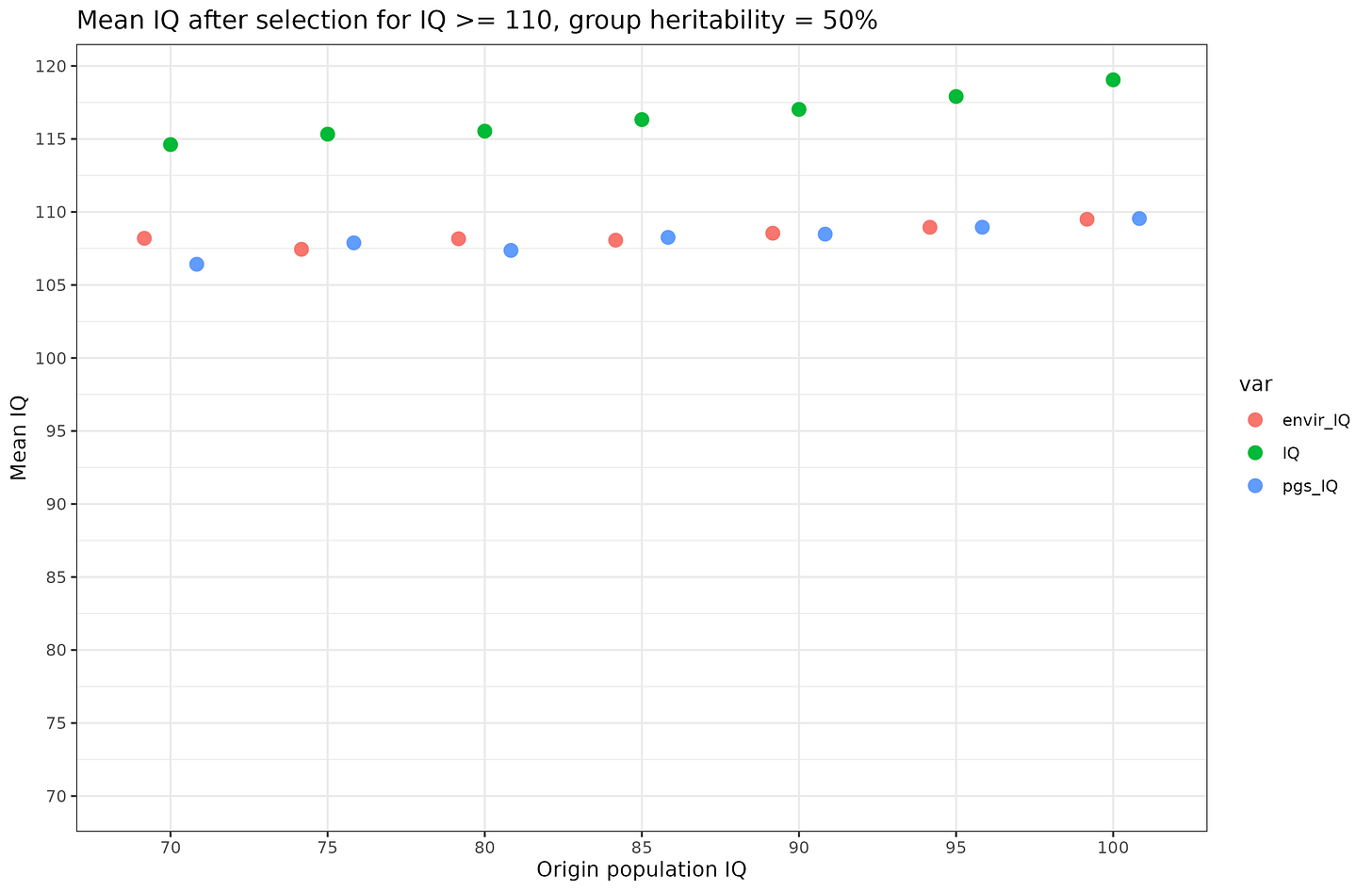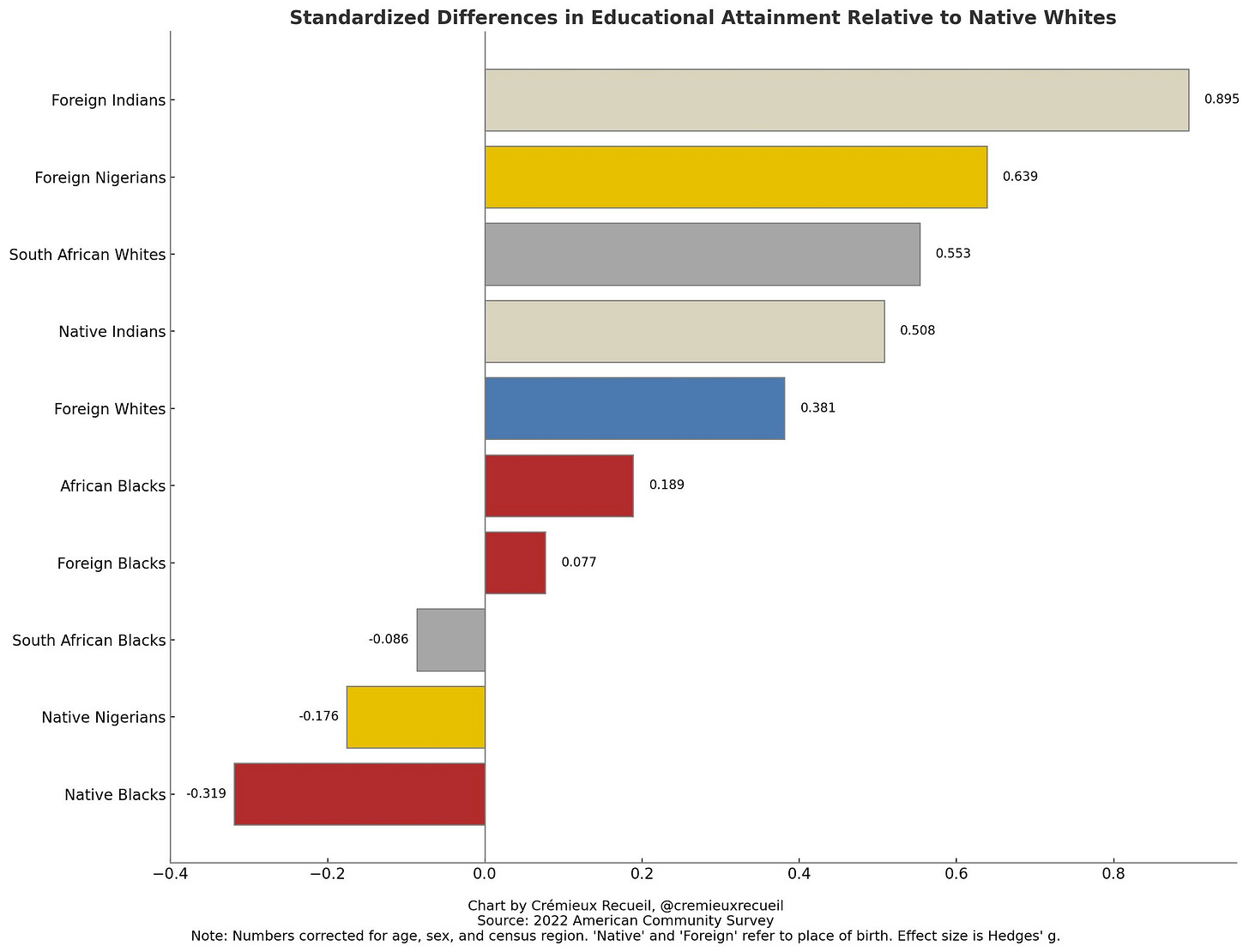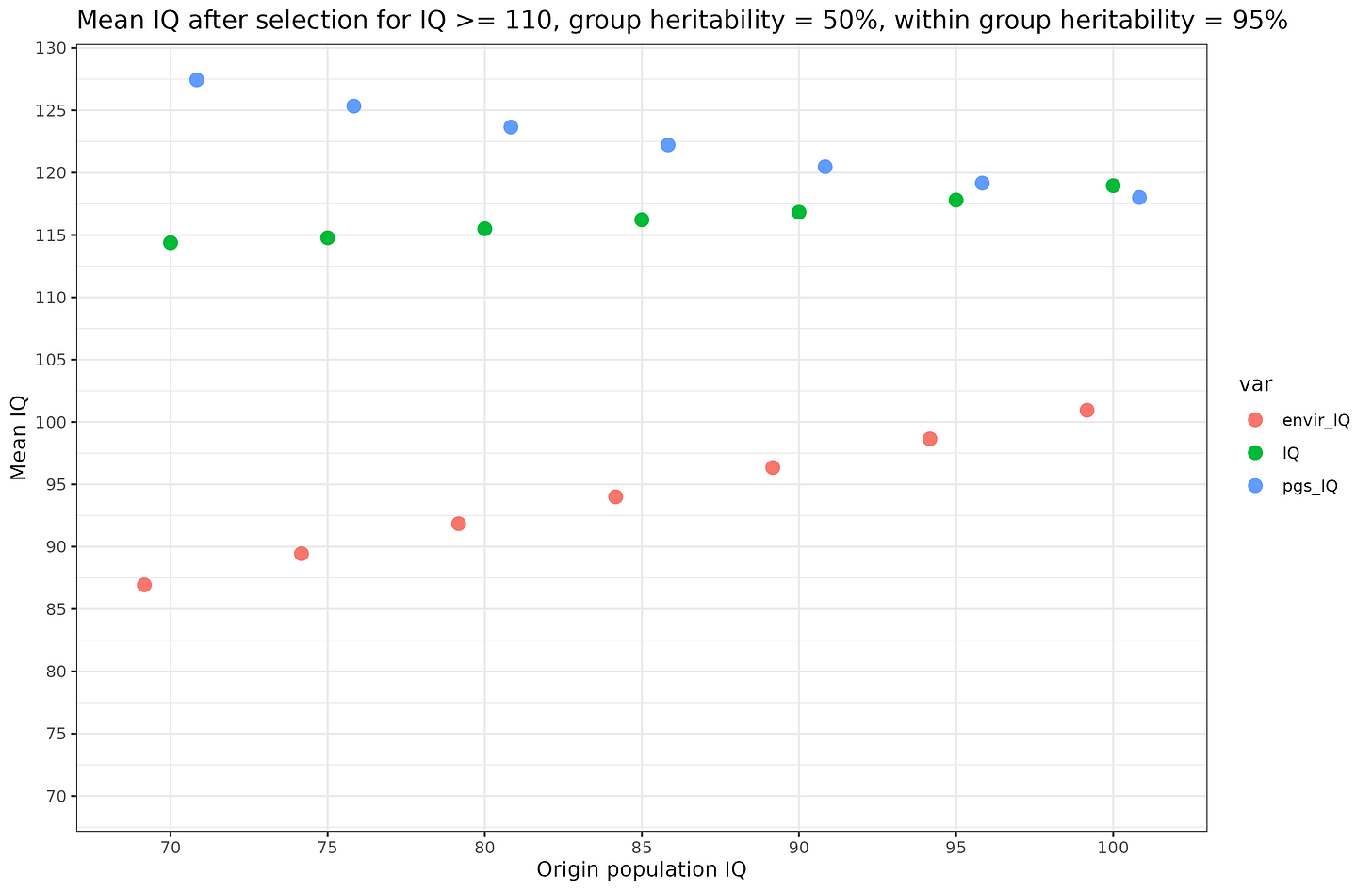Selective migration and regression towards the mean
Regression towards the mean only happens once
There is much discussion in these days about immigration to the West, and in particular, skilled migration to the United States. Critics of migration often point to regression towards the mean for intelligence (IQ) as an issue. This is true, but many of them mistakenly believe that this downwards regression will continue after the second generation, until, I guess, the migrants' descendants have returned to their origin population IQ. This is not the case, the regression only happens once. If regression happened indefinitely, evolution would be impossible.
Here's the verbal tilt explanation (Dalliard has a longer post here). There is a strong effect of genetics on intelligence and other traits. If we pick people from a given population of mean IQ 100 based on having high intelligence, say, above 110 IQ, the average IQ of this selected group will be about 119 IQ. But what is their genetic IQ? It's not 119. The selected group will also have above average non-genetic causes of IQ, whether these are random biological noise (luck) or true environmental effects. If we are looking at measured IQs, there will also be random error from measurement error, but let's ignore that for this calculation. To know what the expected value of their genetic IQ is, we need to know the additive heritability. This is the part of the total genetic score that simply adds up (the effect of variation 1 + that of variation 2 etc.). Fortunately, the math is easy (breeder's equation). If the additive heritability is 50%, then the selected group will have a mean genetic IQ of 50% as high as their phenotypic IQs. If the additive heritability is 100%, there will be no genetic regression towards the mean at all (the amount of regression is 100 - heritability). Here it is better to think in terms of deviations from the mean, so if the deviation is +19 (because 119-100), then the genetic deviation is expected to be 19/2=9.5, so 109.5 IQ. If these people then mate with each other, that is also the expected average of their children because that's their genetic intelligence level after the first selection event. And if these children then mate with each other again, the mean IQ will stay the same forever (all else equal).
But let's simulate some data to make sure we understand things right. In the first simulation, we consider populations with different genetic mean IQs from 70 to 100 (between group heritability is 100%). The within group additive heritability is set to 50%, and we vary the threshold after which people are selected. Doing so gives us this result:
So, in this simulation, if we start with a population of people with phenotypic (real-life) and genetic IQs of 70, and we select those above 110 IQ, this group will have an average IQ of about 114 (green dot on the left). If instead the origin population started at 85 IQ, the selected group would have an average of about 116 IQ (green dot in the middle). Identical selection thresholds lead to some residual group differences. This effect can be smaller or larger depending on the distance of the threshold to the group means. Affirmative action aside, this is why e.g. Jewish doctors are smarter than White doctors who are smarter than Black doctors, even if they all graduated from the same medical school.
But what about the genetic IQs of the selected groups? These are shown in blue. So if we return to the population with IQ 70 (real and genetically), while those selected will have a mean real IQ of 114, their genetic IQ will be about 92. Recall that this is because this is halfway between the original population IQ and the selected group (114-70=44, 44/2=22, 70+22=92). What about those from a population with a mean of 85? Their genetic IQ will be about 101. In other words, that level of immigration selection is sufficient to prevent the children from being below average for the IQ 85 origin population, but not for the IQ 70 origin population.
But what about environmental effects that differ between populations? The above simulation assumes that the group differences are 100% heritable. Between countries, this is probably not the case considering the direct effects of genetics only. In other words, if we went to India and picked 200 random representative couples and moved them to the US to start families, then their children who would grow up in the US would have higher IQs due to the improved environment. Let's say the between group differences are 50% due to genetics, that is, between group heritability is 50%. In this model then, the 70 IQ population group has a genetic IQ of 85 and an environmental IQ of 85. In other words, their intelligence is lowered 15 IQ by each factor compared to the reference population with IQ 100. Let's redo the plot:
So what changed? With the new more realistic values, the chosen group from the IQ 70 population are no longer so extreme in both causes. They are about 1 standard deviation above average in their own population in both genetic and environmental causes (both of which have means of 85 IQ), adding up to about +30, thus giving ~115 IQ (85+30). Their genetic IQ after selection is now about 107 which is also the IQ their children will have. This kind of selection is thus sufficient to prevent their children from being below average.
What if we vary the threshold for selection and look at the effect on the genetic IQ of the selected subgroups?
We can now see that increasing the selection threshold results in higher average genetic IQs for all groups in a relatively straightforward fashion. Even for the IQ 70 origin population, picking people with 100+ IQs results in an average genetic IQ that is about 102. Their children will not be below average. Regression towards the mean is not so extreme when we drop the assumption that between population heritability is 100% and substitute a more reasonable 50%.
What about real life data? While we don't have matched parent and children data with perfectly comparable and unbiased IQ measurements, we do have some data for first and second generation immigrants from the same countries in the USA and their education levels:
Two groups commonly discussed are the Nigerians and the Indians. Foreign-born Indians are about 0.9 standard deviation above average in education, and their children are about 0.5 d above. Foreign-born Nigerians are about 0.6 d above, but their children are about 0.2 below. The groups regressed about 0.4 d and 0.8 d. This difference should reflect, among other things, the difference in average genetic intelligence in these populations. Typically, Africans are estimated at about 80 IQ and Indians may be 85 or 90, we don't have that solid data.
A further complication is that subpopulations within groups may have different genetic means of IQ. Indians in particular are known to have extreme population stratification. Insofar as some of these are above average IQ (e.g. Brahmin), and migrants are disproportionately recruited from them, this will cause the regression towards the mean to be smaller.
To be clear, regression towards the mean will also happen from the bottom and upwards. The math is the same. If you go to a Western country and find some below average people on welfare, and then move these to a remote island to start families, their children would increase a bit towards 100.
Just for fun, we can also look at the bizarre situation of near-perfect within group heritability combined with 50% between group heritability.
Here the within group heritability has been increased from 50% to 95% and the other factors stay the same. But look at the effect on the selection on genetic IQ (again, in blue). The lower the origin IQ, the higher not lower, the expected genetic IQ. How is that possible? It's because when the effect of environment is so small within the population (5%), in order to achieve high IQs (110+), one must almost always have a very strong genetic IQ. And since in this case, there's almost no genetic regression towards the mean, this genetic advantage will be mostly kept in the next generation, while the environmental advantage will disappear for migrants.
Summary
Within a population, genetic regression towards the mean happens because heritability is not 100%. Because of this, part of the reason why a given individual is high on some trait is because they were lucky. Their children will have average luck, so their trait level will be somewhat closer to their mean. If their children have children again with each other to produce a 3rd generation, their average luck will stay at 0, and the genetic average will not change either, so their trait average will remain at the same average as in the 2nd generation.
Between population genetic regression towards the mean depends on multiple factors: 1) within group heritability, 2) between group heritability, 3) selection threshold (or strength), 4) origin population average trait value. It can even produce seemingly paradoxical findings.
Immigrant selection for IQ, or IQ-related traits, will result in the 2nd generation showing some regression. However, it will not be as extreme as some people imagine because the between country differences are only partially heritable. Case in point, if we pick 115 IQ immigrants from a population with an average of 70 (45 IQ above average!), and the between group heritability is 50%, their descendants will have a mean IQ of about 107. As a matter of fact, Indian American children have a mean IQ near 105 despite originating from a country with an average of about 82 IQ.







What about east asians?, specially taiwanese who are the most educated group
Just to give some ideas about what environmental variables might be at play which have been heavily documented in scientific literature premature birth, low birth weight, nutrition, and the amount of book reading that takes place in childhood. Me and my twin sister were born prematurely and with very low birth weight we are much much smaller than other family members and my twin sister seems very significantly less intelligent than my older sister. I believe factors like birth weight and the amount of book reading taking place in early childhood explain my older sister's brilliance she was a gifted child and had a higher childhood IQ than me and she's about to complete her PhD from UCLA. I think there's a connection between how she read so much as a child and her high academic performance. At the same time, I think my older sister is way smarter than both my parents she has the most prestigious education of anyone in the family.